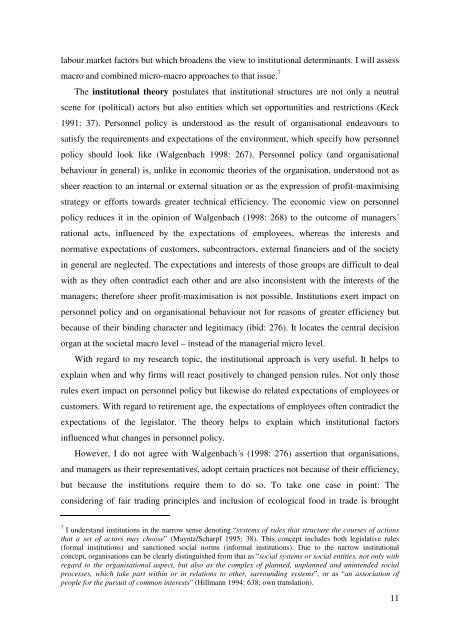Dissertation_Paula Aleksandrowicz_12 ... - Jacobs University
Dissertation_Paula Aleksandrowicz_12 ... - Jacobs University
Dissertation_Paula Aleksandrowicz_12 ... - Jacobs University
You also want an ePaper? Increase the reach of your titles
YUMPU automatically turns print PDFs into web optimized ePapers that Google loves.
labour market factors but which broadens the view to institutional determinants. I will assess<br />
macro and combined micro-macro approaches to that issue. 7<br />
The institutional theory postulates that institutional structures are not only a neutral<br />
scene for (political) actors but also entities which set opportunities and restrictions (Keck<br />
1991: 37). Personnel policy is understood as the result of organisational endeavours to<br />
satisfy the requirements and expectations of the environment, which specify how personnel<br />
policy should look like (Walgenbach 1998: 267). Personnel policy (and organisational<br />
behaviour in general) is, unlike in economic theories of the organisation, understood not as<br />
sheer reaction to an internal or external situation or as the expression of profit-maximising<br />
strategy or efforts towards greater technical efficiency. The economic view on personnel<br />
policy reduces it in the opinion of Walgenbach (1998: 268) to the outcome of managers´<br />
rational acts, influenced by the expectations of employees, whereas the interests and<br />
normative expectations of customers, subcontractors, external financiers and of the society<br />
in general are neglected. The expectations and interests of those groups are difficult to deal<br />
with as they often contradict each other and are also inconsistent with the interests of the<br />
managers; therefore sheer profit-maximisation is not possible. Institutions exert impact on<br />
personnel policy and on organisational behaviour not for reasons of greater efficiency but<br />
because of their binding character and legitimacy (ibid: 276). It locates the central decision<br />
organ at the societal macro level – instead of the managerial micro level.<br />
With regard to my research topic, the institutional approach is very useful. It helps to<br />
explain when and why firms will react positively to changed pension rules. Not only those<br />
rules exert impact on personnel policy but likewise do related expectations of employees or<br />
customers. With regard to retirement age, the expectations of employees often contradict the<br />
expectations of the legislator. The theory helps to explain which institutional factors<br />
influenced what changes in personnel policy.<br />
However, I do not agree with Walgenbach´s (1998: 276) assertion that organisations,<br />
and managers as their representatives, adopt certain practices not because of their efficiency,<br />
but because the institutions require them to do so. To take one case in point: The<br />
considering of fair trading principles and inclusion of ecological food in trade is brought<br />
7 I understand institutions in the narrow sense denoting “systems of rules that structure the courses of actions<br />
that a set of actors may choose” (Mayntz/Scharpf 1995: 38). This concept includes both legislative rules<br />
(formal institutions) and sanctioned social norms (informal institutions). Due to the narrow institutional<br />
concept, organisations can be clearly distinguished from that as “social systems or social entities, not only with<br />
regard to the organisational aspect, but also as the complex of planned, unplanned and unintended social<br />
processes, which take part within or in relations to other, surrounding systems”, or as “an association of<br />
people for the pursuit of common interests” (Hillmann 1994: 638; own translation).<br />
11
















